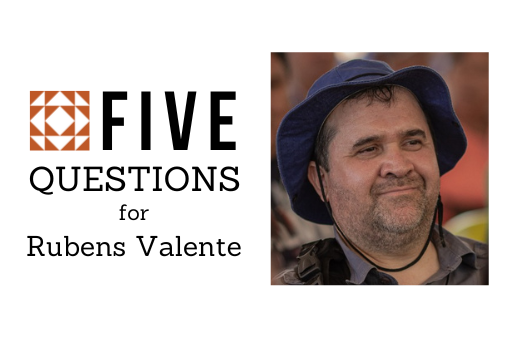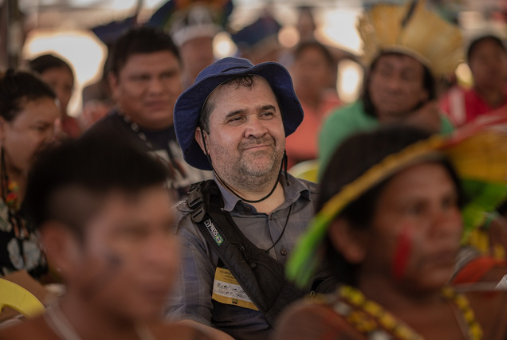Brazilian journalist Rubens Valente had his life turned upside down after the publication of the book "Operation Banker: The Secret Evidence of the Satiagraha Case" in 2014, about the brief arrest of banker Daniel Dantas. Cited as an important character in one of the chapters of the book, Supreme Court (STF) justice Gilmar Mendes sued Valente for moral damages. The journalist was sentenced to pay damages of BRL 319,000 (USD 70,000).
"Its effect was that it provoked the worst censorship of all: self-censorship. Several Supreme Court topics are no longer covered nor critically investigated because journalists fear the consequences," Valente said.

After suffering a hard blow to his personal, professional and financial life, the former reporter from Folha de S.Paulo and UOL received the support of a solidarity network, which organized a virtual "vaquinha" [“little cow” or a crowdfunding campaign] to help Valente compensate the Supreme Court justice. Now, close to finalizing payment, Valente has taken his case to the Inter-American Commission on Human Rights (IACHR), so that this incident may serve as a warning.
LatAm Journalism Review (LJR) invited Valente to participate in its "5 questions" section. In this interview, Valente talks about the consequences of the conviction, the lack of trust with the Judicial Power and the incident’s symbolism for press freedom in Brazil.
(*This interview has been edited for length and clarity)
LJR: What has been the impact of this conviction on your personal and professional life?
Rubens Valente (RV): I have been dealing with this lawsuit for eight years, using up my attention and hours of work helping my lawyer. I had sleepless nights, the feeling that my assets would be dilapidated in a few days. The amount corresponds to everything that I received as labor severance indemnization for 21 years of work at Folha de S.Paulo, and that would be a kind of savings for my retirement. There was also the effect of a deep distrust in the Judiciary.
And it is this disbelief that has provoked a personal crisis. What happened dismantled everything I learned as a journalist. We learned that if you do not make a mistake, do not commit a serious material error and do not use a serious slur, you will not be convicted, because you are protected by freedom of speech and of the press and by the right to information. I am convinced that I did not make a mistake, that I never cursed anyone, and yet I was convicted. From now on, I have no legal security whatsoever to work with.
So I draw once again on the sentence of the trial judge, who said: "There is no untrue content in the book. There is no cursing" [In that first trial, Valente was acquitted]. In fact, he even wrote: "It is a work with few adjectives.” In my mind, by objectively narrating the events, I could not be convicted. We revised the book 12 times. We knew that we were dealing with very powerful people in the Republic [of Brazil] and that we could not make mistakes, and we are aware that we did not.
I consider [my conviction] a direct message not only from Minister Gilmar Mendes, but from the Federal Supreme Court, to all journalists, in the following sense: there is a limit for you, which is to say things that we don't like.
LJR: After the court ruling, how did you try to deal with issues related to Supreme Court Justice Gilmar Mendes and the STF?
RV: I have stopped doing any journalistic investigation of Supreme Court Justice Gilmar Mendes. For the past eight years I was approached by people who had read my book and had information for me to develop a journalistic investigation of various aspects of his career, such as decisions he made and his relationships with lawyers. Some of them had documents.
So as not to be accused of using my position as a reporter, at Folha de S.Paulo and UOL, as revenge or something of the sort, I had to give up any reporting on him. I have lived in Brasilia for 12 years. One of my interest areas was the Federal Supreme Court. After the proceedings I decreased my coverage of it, because Gilmar Mendes has a very influential position in the court.
There is another cost that is not just mine, it is the cost for the press as a whole. There was a deterrent, inhibitory effect, which is not tangible. And it has caused the worst censorship of all: self-censorship. Several topics about the STF are no longer written about and critically investigated because journalists fear the consequences. They find themselves in the delicate position of critically covering a court that will have the last word on a possible case against it.
LJR: What do you expect from the OAS considering your case? Is there any hope for a reversal?
RV: We filed the request in December 2021. I am represented by Abraji, Media Defence — a non-governmental organization from London that is currently working on more than 50 cases, all over the world, of journalists who are victims of lawsuits — and Robert F. Kennedy Human Rights, from Washington, D.C.
As my case worsened in March, the lawyers scheduled a hearing at the OAS, and I went to the IACHR in Washington. The organizations paid for airfare, hotel, food. There I spoke with the people responsible for freedom of expression, and I said that it was the first time I had ever sat in front of a person, in any instance, to talk about my case. It is one of the bases of our request, that our right to due process was jeopardized. I would like an expert in Portuguese and literature to analyze my book, because the Justice says one thing, I say another, one judge acquitted me [in the first trial], another judge convicted me. The only way out would be a technical review by an outside expert.
If the IACHR decides to refer my complaint to the Court, it has a symbolic political effect, but it has no practical effect. It can tell the Brazilian government they found serious problems that jeopardize the right to a fair hearing. It doesn't reverse the decision, but it serves as a warning, and that's what we're after.
The Judiciary, when a magistrate alleges something about someone, needs to surround itself with other evidence, proof, expertise, concrete facts. Because, otherwise, it will be one's word against another's. The word of magistrates, who are the Justice’s colleagues.
LJR: After President Jair Bolsonaro threatened a reporter with assault in 2020, Gilmar Mendes stated that "it is unacceptable to censor journalists for mere dissatisfaction with the content conveyed." On TV Cultura's Roda Viva program in 2019, he said to be an "inveterate fan" and "defender" of press freedom. Do you think that the Justice contradicts himself by asking for compensation for moral damages for the content shown in your book?
RV: Over time, Gilmar Mendes has been rewriting and repositioning his figure in the national scene. In recent years he presented himself as a great defender of freedom of the press, but we know that a few years ago he filed more than a dozen lawsuits against journalists and press organizations.
One of the reasons Gilmar Mendes appears in my book as an important character is that he had, at the time, made numerous attacks on the Brazilian Executive. He cast doubt on the Executive, saying there were wiretaps against Supreme Court Justices, which were never found. The discourse that he alters and reshapes perhaps eases his conscience, but it does not erase what happened shortly before.
The Justice also had, at any time, the possibility of an agreement with the parties in my case. He could’ve called us and said he would accept BRL100,000 [USD 20,400], without monetary correction, but he didn't [Editor's note: the amount of the original lawsuit was corrected or adjusted in the eight years of the legal proceedings to keep up with inflation]. We even asked him if we could pay the debt in installments, but he did not accept that either. Afterwards, the book publisher started conversations with Gilmar Mendes' lawyer, which also resulted in nothing.

Rubens Valente's conviction in a lawsuit for moral damages filed by Supreme Court justice Gilmar Mendes generated a flood of donations to help the journalist pay for the compensation to the justice. “It was a kind of living wake,” Valente said. Credit: Bruno Santos
LJR: Looking back, does the whole career you developed and the book you wrote paid off? Do you regret publishing that book?
RV: I don't regret a single comma, anything I've done. Journalism has brought me the best things I have ever experienced in my life. Journalism led me to this conviction, but on the other hand it allowed me to see all this solidarity. I would repeat what is written because we have the conviction that there was no mistake.
If I had any doubts about journalism, they ended with the crowdfunding campaign that was started to pay off this debt. My social networks were flooded, more than 2,400 people helped with money, in addition to countless messages, emails of support, thanks, and encouragement. Although we have some notion of what we have done throughout life, the campaign allowed me to gauge everything up in a very quick, direct way. It was a kind of a living wake. Now I know what will happen if I walk away. I know who will send flowers, and I even know who will celebrate, which fortunately is the minority.
The crowdfunding campaign reached 92% of the goal, which is an incredible number that I could not have dreamed of. They were donating BRL 5, BRL 10 [USD 1, USD 2] which was very moving to me, because people gave what they could, as well as more generous amounts. This sum was enough to pay the debt the publisher had, because I thought I had already paid my share. Now we are still about BRL 26,000 (USD 5,500) short.
I was fortunate and lucky enough to count on this solidarity network. But many do not and will not. We know of colleagues imprisoned for practicing journalism. If Brazil really believes that the press and journalistic work are a pillar of democracy, it has to take concrete measures to guarantee this pillar, and not just give lip service to journalism. We need concrete steps. One of the concrete steps is to review the methodology of a lawsuit filed by a judge.
It is not something that will change overnight, but I hope that my case will serve as a reflection and an example about what is happening, which affects all sectors of the Judiciary. And the solution has to come from there too, but I don't know if they are willing to start reflecting on this.